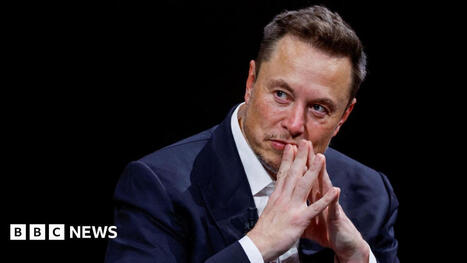Trades, machine operations and administrative roles are most at-risk, says leading educational research charity
Get Started for FREE
Sign up with Facebook Sign up with X
I don't have a Facebook or a X account

 Your new post is loading... Your new post is loading...
 Your new post is loading... Your new post is loading...
Regulated fares, which include season tickets and off-peak returns, will not see annual price rises for the first time in 30 years, the government announces.
Graham Watson's insight:
And in another part of the interview, it was also announced that regulated rail fares are also going to be frozen. This covers 45% of rail fares, including season tickets and off-peak returns.
This marks a departure from the usual above-inflation increase in ticket prices.
Need for new road taxes is clear – but there are concerns that pricing plan could stall transition away from petrol
Graham Watson's insight:
The Guardian's transport correspondent, Gwyn Topham, looks at the implications of the introduction of road pricing for electric cars in next week's Budget, trying to work out whether it will be a revenue raiser or stop people choosing to drive an electric vehicle.
He starts from the premise that "the need for new road taxes is clear". He's right there...
Ford's UK boss says it is "not the right time" to tax electric vehicles when demand has already stalled.
Graham Watson's insight:
The Managing Director of Ford UK, Lisa Brankin, has warned the Chancellor that taxing EVs could be counter-productive and further slow their take-up. Yet another proof that turkeys rarely vote for Christmas.
She's of the view that car manufacturers can only even come close to reaching the ambitious sales targets set by the government if there are continued interventions to drive the market.
The decision allows Instagram's parent company to avoid the prospect of the company breaking up
Graham Watson's insight:
A US judge has decided that Meta doesn't have a monopoly in certain parts of the market for social media, meaning that the Federal Trade Commission won't be able to break up the social media giant after its acquisitions of Instagram and WhatsApp. The competition authorities are, shall we say, less than pleased.
Patrick Vallance says government trying to rebuild relations with pharma industry as he outlines life sciences ambition
Graham Watson's insight:
The issue of the pricing of pharmaceutical products rumbles on, with Science Minister, Patrick Vallance noting that talks continue. It seems that there's a realisation that the UK will have to pay more for medicines, bringing it more in line with other developed economies.
It's a complex issue because it seems as though investment in big pharma and life sciences is contingent upon the UK government getting this right.
From Taradell to Galicia, cooperatives are supplying cheap, clean electricity to homes and helping tackle fuel poverty
Graham Watson's insight:
The renewables revolution continues apace in Spain...
Warning comes as scenario in which global demand continues to grow until 2050 is included in IEA outlook report
Graham Watson's insight:
The International Energy Agency is forecasting a glut of oil - or a surplus - if you prefer, with over-production of 4m barrels per day. I wonder if Year 12 economists yet feel confident enough to be able to both define what we mean by a shortage and draw a diagram showing what's likely to happen to oil prices if there's a shortage and, by definition, excess supply.
The latest Global Tobacco Industry Interference Index shows how companies are succeeding in influencing governments to ensure taxes remain flat or stubbornly low
Graham Watson's insight:
Tobacco taxes are perhaps the sacred cow of libertarian economists: this report suggests that the environment in which they're set isn't one that fully reflects the available scientific data, and is, instead swayed by the power of global tobacco companies.
The article posits that the negative externalities associated with tobacco are extensive: "estimated at about $1.7tn (£1.3tn) in excess healthcare expenses and productivity losses in 2021 – the equivalent of 1.7% of global gross domestic product. That does not include the costs of tobacco-related environmental harm" and notes that there's now a Global Tobacco Industry Interference Index to monitor the influence of the tobacco industry on government policy.
Is it right that governments should be effectively subsidising a business where the top four companies made $125bn in revenues in 2024, at the expense of public health.
MP asks for explanation from Southern Water amid concerns the spill could have dire impact on rare sea life
Graham Watson's insight:
A classic negative externality - marine pollution - in this case with plastic beads washing up on Camber Sands, but presumably not Waikiki, with the potential to kill marine life.
Southern Water is in the frame for permitting the spill.
The talks focus on ITV's Media and Entertainment division, which include its TV channels as well as its streaming service, ITV X.
Graham Watson's insight:
Another demerger is on the cards, with ITV thinking of selling its Media and Entertainment division to Sky's parent company, Comcast. I can see further consolidation in the sector, with the number of firms competing for advertising revenues and struggling to fund new content, particularly the established broadcasters, such as BBC and ITV.
However, you wonder what selling this part of the business will leave ITV; the advertising business, perhaps?
Pascal Soriot calls for cost-effectiveness thresholds to undergo ‘substantial adjustment based on inflation’
Graham Watson's insight:
Another article highlighting the ongoing debate about drug prices in the UK, and noting that "the National Institute for Healthcare and Clinical Excellence (Nice) cost-effectiveness thresholds for new drugs had not changed for two decades" and that the UK only spends 0.3% of its GDP on medicines, compared to around 0.6% elsewhere.
The corollary is that higher prices for medicines may also encourage investment into the UK from big pharma and the life sciences sector.
Decision is bitter blow to Brazil ahead of fund’s launch at Cop30 – and an embarrassment to Prince William
Graham Watson's insight:
Just a fantastic article with lots of great Economics: is the UK's position on this issue economically rational? What tools would you use to judge this?
Lots to consider here - the negative externalities of deforestation, the difficulties of co-ordinating international decision-making, game theory and so on. |
Bad season of bird flu in UK hits supply of Christmas turkeys | Food & drink industry | The GuardianAvailability of chickens and ducks also expected to be tight, with 5% of the seasonal flock culled so far
Graham Watson's insight:
D&S and Christmas turkeys. Basics...
But it is also possible electric vehicle owners could face a new tax elsewhere in Wednesday's Budget.
Graham Watson's insight:
The Lord giveth, and the Lord taketh away...
It seems that the introduction of road pricing for electric cars is being accompanied by support to help people buy them, with Transport Secretary, Heidi Alexander announcing an expansion of Electric Car Grant scheme. Whilst this may seem to be a good thing, there's a bit of a concern that such a move will have little effect - and quite a high opportunity cost.
There's also a suggestion that it tends to benefit the well-to-do, because the expense of electric cars necessarily means that, even with the grant, they are the only people that can afford them.
Regulator Ofgem will announce its next price cap, affecting the bills of millions of people from January.
Graham Watson's insight:
OFGEM are going to announce the next version of the energy price cap today, with analysts expecting a 1% reduction in the average energy price.
It comes at a time when the cold snap means that many people are using more energy than they'd like.
Amazon’s Zoox will give free rides in parts of the city in attempt to counter Waymo’s early lead in self-driving taxis
Graham Watson's insight:
A nice bit of innovation for you: Amazon are launching their robotaxis in San Francisco, and offering free rides, in an attempt to claim market share from rivals Waymo.
The future's already here...
The Competition and Markets Authority is taking the action following a review of online pricing and sales practices.
Graham Watson's insight:
The competition authorities are investigating a group of businesses from across a range of sectors over so-called online drip pricing. This is where the consumer is shown an initial price but the final price is increased by a number of additional fees, something that is cunning - it's exploiting loss aversion to extract more money from consumers - and proving that knowledge of behavioural economics can come in useful, if only in helping spot this sort of thing.
Touts, and ordinary consumers, will no longer be able to charge anything more than price at which they bought ticket
Graham Watson's insight:
Whilst this garners favourable headlines, you might argue whether or not it's good economics or not. There's a school of thought that says that touts actually improve economic efficiency because the resale of tickets means that the tickets go to those people who value them the most and are prepared to pay the highest prices for them.
However, from an ethical perspective, you might wonder whether this is one of those cases where economists know the price of everything but the value of nothing.
Electric cars will get a 25% discount and electric vans and HGVs 50% in changes to be introduced in January
Graham Watson's insight:
The London Congestion Charge is going to rise by 20%, and electric vehicles are going to be obliged to pay it, albeit they will get a 25% discount. There are also reduced rates for electric vans and HGVs.
The fact is that the congestion charge has worked - and it's being tweaked. By 2027, the 90% discount for local residents will only apply to those owning electric vehicles. Surprise, surprise, it's being opposed by motoring groups but it has significantly improved air quality in the capital too.
The airline is only accepting digital boarding passes from Wednesday.
Graham Watson's insight:
Nice straightforward costs-related article on the BBC website - as ever, Ryanair is focused on the bottom line, profits and the move to digital boarding passes only is a move to expedite that. However, I wonder if you might be able to draw a cost and revenue diagram that might show how this would increase the company's profit?
Watchdog’s flagship report says rise in low-carbon electricity will make transition ‘inevitable’, despite Trump’s calls to carry on drilling
Graham Watson's insight:
This could easily be an International story, but if the International Energy Agency is forecasting that the rise in renewable energy signals the death knell for nuclear power, then it seems to a highly likely. The report also notes that, despite demand for energy rising by 40% in the next decade, it will be cheaper renewables and nuclear energy that are likely to take up the slack, rather than fossil fuels.
And, disappointing to relate, it appears that the grubby little man that leads the free world has failed in trying to pressurise the organisation into incorporating a brighter future for fossil fuels in the report. How much simpler it would be to live in a world that bent to his cretinous whim.
Chinese manufacturers are using the electric transition to seize market share, with the UK as their gateway
Graham Watson's insight:
This today's must-read article, with Jasper Jolly looking at the rise of Chinese electric vehicles, noting that 5 years ago China lagged behind the established manufacturers in terms of its share of global exports. Today, it is streets ahead, with Chinese owned companies selling far more vehicles that anyone else - and more than Germany, South Korea and the US combined.
In particular, the UK has seen Chinese brands start to dominate - and it's an interesting thought experiment to see how many Chinese-owned brands you can name. Did you know, for example, that Volvo, Polestar and MG are all Chinese-owned.
The richest man in the world will get hundreds of millions of new shares if he hits his targets.
Graham Watson's insight:
I leave this her without comment. It defies explanation.
Report to be discussed at Cop30 says global agreements should target carbon intensive activities and ‘ultra high net worth individuals’
Graham Watson's insight:
A week or two of COP30, ultimately, I fear leading to words rather than actions, but the intentions are good. This suggests that there's a willingness to target carbon intensive industries, with a particular focus on encouraging developed economies to support developing economies in their attempts to tackle climate change.
As with my previous 'scoop', this is easier to promise than deliver on, for obvious reasons. |


































Could be Macro- could be Micro, this Guardian article looks at the impact of AI on the relationship between capital and labour and whether they are substitutes or complements.
As a general rule, capital is a substitute for low-skilled labour but a complement for high-skilled labour.